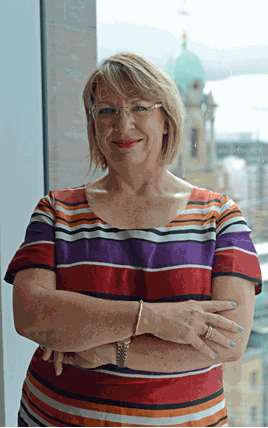This is a fascinating time in the history of UK railways. The debate about nationalisation rages on within the Labour party, Network Rail is on the public books with serious questions being asked about its future, Borders Railway (the longest railway to open since the Great Central Railway in 1899) started carrying fare-paying passengers on September 6 (see pages 6-9), and waves of new trains are destined for our railways.
There is a lot to contend with, and Hitachi Rail Europe Managing Director Karen Boswell is excited. Having been praised for her work as Managing Director of East Coast, she left when Virgin Trains East Coast took over and has since taken her expertise to Hitachi.
And Boswell is fiercely determined that young people should get a chance in an industry she joined 15 years ago.
She meets RAIL on August 27, in Hitachi’s Holborn offices in London. That the Japanese giant has a presence in the capital is a signal of intent and a real commitment to the UK and the European markets, she believes.
It’s also exactly one week until the firm opens its Newton Aycliffe factory in the North East, only a few miles from the birthplace of the railways on the Stockton & Darlington Railway. Boswell beams a broad smile when she talks of that. A genuine excitement comes through as she discusses the factory and the opportunity it offers.
“What I need for the future going forward is to always have Newton Aycliffe full. It isn’t a perfect world - you can’t say when you’re bidding for lots of different rolling stock contracts, and this is globally, where those will fall into place. You win some, and you won’t win some.
“We’re very comfortable with the IEP contract. We’re very comfortable with the AT200. And actually, what we have is a global production view - we have the best of being able to leverage our global perspective and things like body shells, friction stern shells and bogies. There are over 30 suppliers at Newton Aycliffe that are sourcing 72% of all the parts.
“I can give you another interesting fact that came into my mind recently. When I first went up to Newton Aycliffe and looked at how that was designed and built - 95% of the team that worked on that, from architect designing to the build out, 95% of the workforce came from within a 50-mile radius. I think that’s a pretty impressive stat.
“They are all local. We’ve had over 12,000 applicants… 12,000! 730 jobs at the beginning. So there’s a lot of pride in the North East for getting that right. I know the North East well - you talk to people, you go in a cab, you go in a coffee shop, everybody knows about the plant, everybody will talk to you about making it a tremendous success. And that’s not lip service.”
It sounds as if Boswell is clearly looking forward to the opening.
“I am! What’s not to like? I think there are some really interesting things happening in the railway. I don’t think there’s any better industry to be in.
“When you think about the investment, the innovation that’s coming, and from a Hitachi perspective the innovation that we’re also bringing to the engineering side of train building. And there’s some interesting stuff out there as well as our system side of things, through TMS and signalling.
“But being in a position where we’re going to be opening up a brand new manufacturing plant, I call that a pinnacle of your career in lots of ways. I do think it’s bringing engineering back, it’s going full circle.”
Hitachi Class 395s have been in traffic since 2009, while the first IEP Class 800s have arrived in the UK for testing. Class 381s (AT200s) are due to begin arriving next year, while in 2018 AT300s will enter traffic between London and Penzance.
But Hitachi has other deals as well, including a recent traffic management system (TMS) contract for the central core through London (RAIL 780). This will enable Network Rail to operate the 24 trains per hour that form the key element of the £6 billion Thameslink project, as it triples capacity from just 8tph in 2008.
Is it this level of investment and opportunity that attracted Boswell to Hitachi?
“It wasn’t just the new factory, no,” she laughs. “I count myself as very fortunate having a second career, after running a TOC . I believe I ran one of the best TOCs in the country. I’m very proud of the result myself and my team achieved in the last five and a half years.
“I think it was a really great opportunity to get into the supply chain, because my career - you’ll know this from knowing some of my philosophies from previous roles - I’ve always been interested in the end customer perspective.
“I believe successful companies are around what fare-paying customers are interested in. And for me now, in supply chain and manufacturing and maintenance, actually making sure that I listen to my customer, and my customer’s customer. It’s really customer-focused engineering.















Login to comment
Comments
No comments have been made yet.